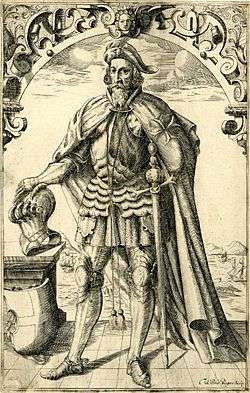Thomas Docwra

Thomas Docwra (1458? – 1527) was Grand Prior of the English Knights Hospitaller.
Biography
Thomas Docwra, the son of Richard Docwra and Alice Greene, the daughter of Thomas Greene of Gressingham, Lancashire,[1] was admitted to the Knights Hospitaller at the age of 16, spending about four years as a novitiate. In 1480 he was in Rhodes with Sir Thomas Greene during the unsuccessful Turkish siege of the island. He later became preceptor of the Order's holdings in Dinmore, Herefordshire. In 1494 Sir Thomas became Prior of Ireland and then a year later Turcopolier of the English tongue. By 1499 he became captain of the castle of St. Peter in Bodrum. In 1501 he succeeded Sir John Kendal as Grand Prior in England, taking responsibility for all their property in England. He reversed the policy of leasing out property to secular tenants, most noticeably with Temple Balsall in Warwickshire. He terminated the lease of Sir Robert Throckmorton and attempted to gain the arrears of rent. When Sir Lancelot Docwra arrived to reclaim the property, Throckmorton had fortified the manor house and refused to allow the Hospitallers entry.
Nevertheless, Thomas let out Temple Dinsley in Hertfordshire to his nephew John Docwra in 1519. Another transaction was the leasing of land in Hampton, Middlesex to Thomas Wolsey, the Archbishop of York. This is where Wolsey built Hampton Court of which Henry VIII of England took possession when Wolsey fell from favour. Overall the Order had over 40 preceptories spread out from Cornwall to Northumberland, the majority of which retained their concentual status. Docwra would have had to visit them all once a year.
As the Lord of St John, Docwra was a senior lay baron with a seat in the House of Lords. He was one of the peers who tried the Duke of Buckingham for treason in 1521. He was a member of the Privy Council and Admiral of the English Fleet, which may have been an honorary title.
As Grand Prior of St John he served on a number of commissions: he was involved with drainage in Lincolnshire, where the order had substantial holdings and was brought in on a commission to investigate irregularities by the Masters of the Mint. he was also connected with the "search for suspicious characters in London" in 1520. But perhaps it was his diplomatic activities on behalf of Henry VII and Henry VIII for which he is most remembered. He engaged in marriage negotiations as well as financial and commercial matters. When in 1510 the Grand Master of the Order in Rhodes requested that he come and help defend the order against the Turks, the King refused to allow him leave to go. But in 1512 he was expected to turn up with 300 men at arms and a 200-ton ship when the King had a military adventure to pursue in France. In 1520 he accompanied the King to France to the "Field of the Cloth of Gold".
Docwra died in May, 1527 at Clerkenwell and was buried in the priory church. His estate passed to his nephew, another Thomas Docwra, who was High Sheriff of Hertfordshire.
He was succeeded as Grand Prior by Sir William Weston, the last Grand Prior of the Knights Hospitaller in England before the dissolution of the monasteries.
See also
Footnotes
- ↑ Burton 1905, p. 324; Chibi 2006.
References
- Burton, J.R., ed. (1905). "The Sequestration Papers of Humphrey Walcot". Transactions of the Shropshire Archaeological and Natural History Society. 3rd ser. 5. Shrewsbury: Adnitt and Naunton. p. 324.
- Chibi, Andrew (May 2006) [2004]. "Docwra, Sir Thomas". Oxford Dictionary of National Biography (online ed.). Oxford University Press. doi:10.1093/ref:odnb/7726. (Subscription or UK public library membership required.) The first edition of this text is available as an article on Wikisource:
 Gairdner, James (1888). "Docwra, Thomas". In Stephen, Leslie. Dictionary of National Biography. 15. London: Smith, Elder & Co. pp. 142–144.
Gairdner, James (1888). "Docwra, Thomas". In Stephen, Leslie. Dictionary of National Biography. 15. London: Smith, Elder & Co. pp. 142–144.